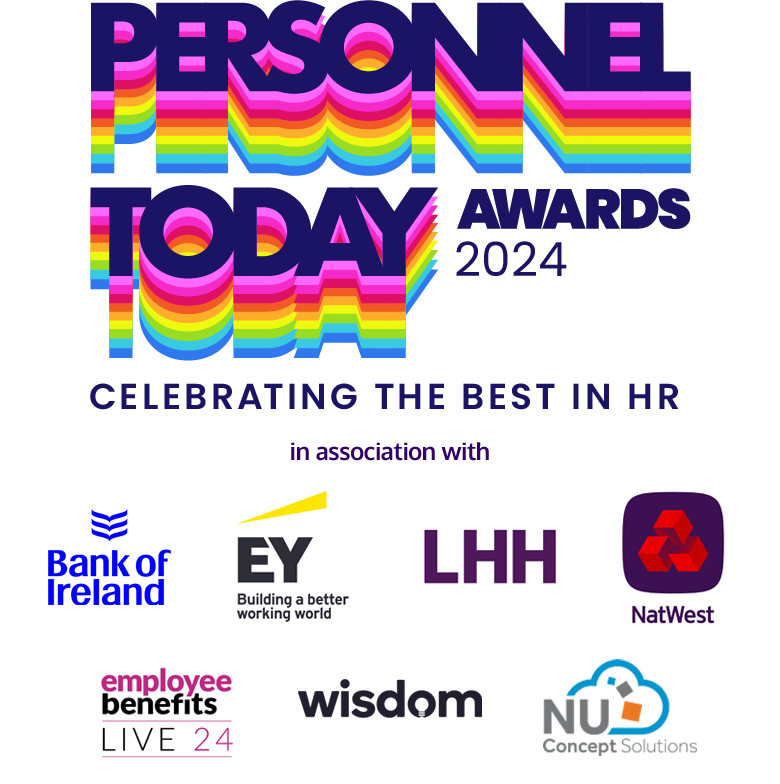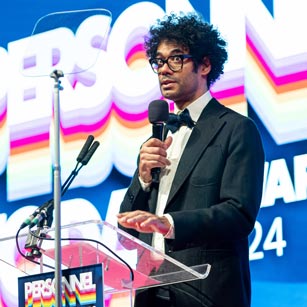The judges were interested to see how King’s College London’s HR team delivered a clear and effective strategy for a thriving staff community. The team’s success in local engagement, innovative projects, and measurable outcomes —achieving lower attrition, greater internal promotions, and enhanced staff loyalty – was particularly impressive to the judges. We look at their winning entry and those of our other highly commended finalists.
WINNER
King’s College London
In 2022, King’s College London announced a new university-wide strategy for delivery by 2026, which tasked the organisational development team with delivering one of its four key goals – creating a thriving staff community.
To understand the challenges, the team carried out its first employee survey in six years to its 10,500-plus staff, which highlighted where it excelled and what could be improved. It then identified three key strategic focuses, which were all improvement areas, and assigned specific, measurable goals for each. These included goals around inclusion and belonging, wellbeing and engagement, development and progression.
To enable delivery against the above, King’s structurally adjusted the team, expanding from seven to 21 individuals and bringing equality, diversity and inclusion under its leadership.
Having identified areas for improvement via the survey, the team then outlined actions to take divided along two lines: at central level by the OD team and at local level by KCL’s 27 faculties/directorates. To ensure each function focused on delivering its plans, it delivered masterclasses to local function leaders, created communities of best practice and regularly met one-to-one with all functions. Central level initiatives included spearheading a new apprenticeship programme improved policies/employee benefits to enhance wellbeing and enhanced training for managers and leaders.
The impact of its actions saw positive results in reducing ethnicity and gender pay gaps, while voluntary attrition also reduced. In terms of development and progression, internal promotions versus external hires increased, as did job applications from staff referrals increased.
Personnel Today Awards
All our 2024 winners revealed
View the 2024 photo gallery
The Personnel Today Awards 2025 open for entries around Easter
Sign up to keep updated
RUNNERS-UP
Leyton
Financial advisory company Leyton set a strategy with the overall goal of building a collaborative and high-performing culture, while nurturing its workforce. It aimed to support people in their work and family life, enhance their wellbeing and increase job satisfaction and productivity, while promoting a positive work environment which allowed employees to achieve rewarding careers. Using its existing HRIS system, Leyton captured information to feed into a custom-made HR dashboard which allowed it to track and measure people analytics and identify key areas of focus and improvement.
A further dashboard was created to measure diversity, equity and inclusion and it then introduced an employee-led Diversity Council. A DE&I survey was sent round and it undertook one to one and group meetings with staff across all departments. The data helped it to define the next steps to developing, enhancing and introducing new benefits and initiatives. Leyton enhanced its flexible working policy further to include remote working, enabling staff to work from a different location at home or abroad for up to three weeks at a time.
After benchmarking and analysis, it launched a family friendly policy, allowing staff to receive up to 26 weeks maternity, shared parental leave and adoption leave with enhanced paternity leave from day one and year one. The talent development team introduced various training, also supporting staff further with coaching and mentoring sessions. The company introduced awards and nominations, as well as a monthly podcast. It held financial wellbeing webinars and a poll, and implemented a new employee assistance programme and in-house mental health training for managers.
Lucy Group
Power distribution company Lucy Group wanted its people to know that they could develop their careers at the organisation and to feel an intrinsic connection to the business, understanding they influence commercial success and that every contribution is genuinely valued. It aimed to nurture innovation, providing products and services that meet customers’ changing needs, and to embed sustainability across its operations and product offering.
Achieving its goal of ‘performance excellence’ required careful planning, commitment, influencing and collaboration. It started by introducing SMART objectives and also implemented a new global HRIS system, Oracle, to capture and manage people data. Communication, training, stakeholder engagement, data analysis, reporting and one-to-one coaching were key activities introduced by the HR team.
The team received resistance from all levels, but kept up momentum during the pandemic. A turning point in shifting senior managers from detractors to advocators was the HR team’s establishment of a set of five overarching strategic priorities: high performing businesses; customer at the centre; engagement and development; sustainability; and excellence through innovation. Each business leader was invited to adapt these priorities to their own business and then to cascade from the top down, such that each employee’s performance objectives were closely aligned to business plans.
The HR team also introduced employee engagement surveys, using feedback to track employees’ understanding and endorsement of the group’s strategic approach and to take corrective measures in pockets where alignment was lagging. Sponsored by the executive board director with overall responsibility for HR, the entire executive board became strong advocates of the performance excellence strategy and supported HR’s drive to encourage each of the five respective business leaders to adopt it and proactively put it into practice.
South Western Railway
South Western Railway’s people and culture team aimed to deliver strategic interventions across its entire portfolio – from recruitment and employee relations, to wellbeing, benefits and reward, and learning and development – against a background of strained industrial relations, reduced engagement and a nine-month industry-wide recruitment freeze.
Its three-year strategic plan outlined a commitment to making SWR a great place to work. Within this, six people and culture goals recognise the important role its people play in delivering positive change for its customers and business. It has local strategies that identify emerging trends, opportunities and challenges and set out plans to address them.
SWR has adapted its ways of working, bringing together specialists in culture and engagement, inclusion and diversity, recognition and benefits, and leadership development into a single culture and change function. Changes have been made within recruitment too. It has increased the team size and adopted a business-partnering approach. The team also procured a modern, modular, web-based HR Management Information System (HRMIS) solution, finally bringing all staff records together in one place, while a new system trainer role was created.
The employee relations team has delivered in-house training and coaching for managers, including ensuring all staff could access and understand their new payslips, effectively managed the local impact of prolonged national industrial action and designed T&C improvements. SWR’s culture and change function has improved its recognition and benefits programmes, while the wellbeing team has worked towards ‘ensuring all SWR staff feel supported at work’ by supporting its 100-plus workplace mental health first-aiders and rolling out a new trauma risk management policy and training.
A new purpose, vision and mission has been developed for the organisation, supported by a set of underlying behaviours.
SUEZ Recycling and Recovery UK
In 2023, after a period of uncertainty, the leadership team at SUEZ Recycling and Recovery UK made strategic business decisions to ensure consistency and resilience. As well as changing the leadership team structure it relaunched and renewed the company strategy, with a goal to ‘increase revenue by at least 50%, to reach £1.5 billion by 2030. To meet these goals, the HR team adopted a collaborative approach.
A mobilisation plan was developed to incorporate all HR departments and beyond: learning and development, HR systems, people services, operations, resourcing, health, safety and wellbeing, and payroll and benefits. Central to this approach were monthly mobilisation meetings with all teams, and through this, it was able to collaborate to create an engagement plan and materials, ensuring new employees had all the information they needed to integrate effectively.
To ensure early engagement, the HR team worked together to develop various key milestones for all mobilisations. It also developed mechanisms to engage regularly with the full business services team. Against the backdrop of uncertainty, the mobilisations and acquisitions show the company is moving in the right direction towards meeting its growth targets. It was able to distribute all necessary PPE and training to employees. It also measured its payroll data, which showed an average of more than 80% of individuals were paid on time for their first payroll cycle.
It achieved good levels of employee engagement as well as a reduction in sickness absence.
Zopa Bank
When Zopa Bank acquired its first company, it needed to significantly reduce attrition and boost productivity while maintaining high levels of engagement in order to deliver its business strategy.
In the past 18 months, the firm has significantly developed, hired and reorganised its people team capability. It has introduced strategic business and talent acquisition partners, as well as created a people analytics team, to provide deeper strategic guidance and operational support on all aspects of the employee lifecycle. It also monitors and evaluates the impact of initiatives on both business outcomes and employee experience.
Zopa created a people experience team, with a mandate to ‘own, influence and develop’ all people facing experiences such as engagement, benefits and internal communication. This team continuously analyses of the internal and external environment, the business needs and challenges, while gaining employee feedback and expectations. Using this information, it identified the key priorities and opportunities for improvement, developed a roadmap for implementation and worked with senior management and other functions to gain buy in and their support for change management and activation.
This collective insight is combined to create its long-term people strategy. People outcomes now make up one of four cornerstones of its overall company strategy, influencing a significant part of the company balanced scorecard. It leveraged its expertise and skills to provide innovative and effective solutions for the people-related issues and opportunities, and used various tools and methods to execute initiatives, such as HRIS, surveys, workshops, coaching, and mentoring. Its people team consists of 31 professionals, who work together and have have a clear and shared vision of what it wants to achieve, with individual goals, roles, and responsibilities defined accordingly.

Sign up to our weekly round-up of HR news and guidance
Receive the Personnel Today Direct e-newsletter every Wednesday

